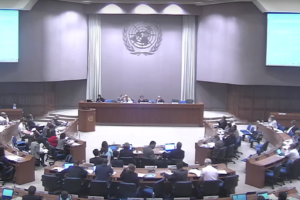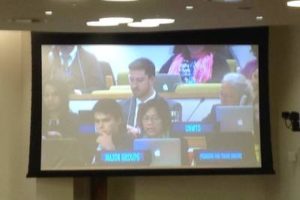IBON International Update #2 – On CFS
October 11, 2013
Committee on World Food Security 40th Session
[[{“type”:”media”,”view_mode”:”media_large”,”fid”:”591″,”attributes”:{“alt”:””,”class”:”media-image”,”height”:”73″,”style”:”width: 309px; height: 73px; margin: 5px; float: right;”,”typeof”:”foaf:Image”,”width”:”309″}}]]
FAO Headquarters, Rome, October 10—Four years after the UN Committee on World Food Security (CFS) reform process started in 2008, it remains to be seen whether it has learned its lessons well. At the annual CFS 40th session being held this week, discussions on responsible agricultural investments, biofuels, and the post-2015 development agenda are among the key issues taking center stage.
Agricultural Investments
Mobilizing agricultural investments as a means to address hunger and malnutrition is being taken up from two divergent standpoints, even as both seem to agree to place the interests of small-scale food producers at the core of the discussions. On one hand, a strong private sector pitch continues to push for increased agricultural productivity through private investments, which often runs against interests of small communities. On the other hand, grassroots organisations call for food sovereignty and stronger domestic food systems, and work for investments that align to these goals.
CSOs point to the need for definite mechanisms that will put an end to land and other resource grabs, which are missing in the current draft. The voluntary nature of exercising “investor responsibility” in agriculture likewise makes its enforcement optional for governments. The call for “responsible” agricultural investments itself denotes the proliferation of irresponsible investments that facilitated plunder of resources especially in the global South.
With one year to go before the CFS adopts final guidelines in its next session, it has become more important than ever to ensure that these consultations are genuinely inclusive of all stakeholders, especially grassroots groups and social movements.
On the other hand, CSOs are calling for small food producers’ access to and control of land and other resources as well as for the promotion of sustainable agroecological models of production, in reaction to the High Level of Panel Experts reports on “Investing on Smallholder Agriculture and Nutrition”.
Biofuels
Discussions on biofuels continue to heat up as governments led by Canada and the US continue rejecting any reference to adopting a human-rights based framework on biofuels. CSOs have taken a strong critical stance against biofuels, identifying it as among the factors for increased global land grabs and spikes in food prices.
CSOs cite various research studies, which indicate that biofuel production has intensified land grabs. According to an ActionAid study, six million hectares of land in Sub-Saharan Africa are now controlled by European companies producing or planning to produce biofuel feedstock. A GRAIN study says that between 2002 and 2012, there have been 293 cases of land grabs worldwide covering over 17 million hectares for the production of biofuel feedstock. Biofuel policies have dismally failed in their supposed intent of reducing greenhouse gas (GHG) emissions. On the contrary, as CSOs point out, these have contributed to greater GHG emissions through land use change and reliance on an energy-intensive industrial agricultural production model.
Among the CSO calls for governments are the following:
i) To eliminate direct and indirect subsidies for biofuels, including targets, mandates and blending quotas, because the evidence shows that such subsidies and incentives are adding to food insecurity and malnutrition, contributing to food price rises and volatility, to land-grabbing, to the displacement of food production, to water grabbing and greater water scarcity;
ii) to adopt a human rights framework that promotes food sovereignty and guarantees the free, prior and informed consent of affected communities, including people's rights to reject policies and programs that are against their interests and which undermine domestic food production systems; and
iii) to mandate country-level and regional multi-stakeholder human rights assessment of the impacts of biofuel policies, ensuring genuine participation of vulnerable communities.
At the CFS 40th session, UN Special Rapporteur on the Right to Food Olivier de Schutter delivered an intervention reminding governments that it is not their duty to meet the market-driven consumption demands of the rich countries through biofuel energy production but to ensure that people's right to food is met. He stressed that biofuels production is putting increased pressure on lands and called for an end to it.
Post-2015
Still at the level of broad strokes and needing specifics are the two related questions of (1) how agriculture and rural development can and should be among the central issues in the post-2015 development agenda, and (2) how various development actors can contribute to the current two-track processes. These processes are, first, the Open Ended Working Group discussions led by UN in its New York headquarters towards a successor framework to the Millennium Development Goals (MDGs), and second, the governmental discussions on the Sustainable Development Goals (SDGs) as a direct outcome of the Rio+20 UN Conference on Sustainable Development held in Brazil last year.
Criticisms have earlier been raised on how the MDGs were created by a handful of UN officials in New York in a process that excluded national governments and vulnerable populations. MDG #1 of halving global poverty by 2015 remains a long shot, despite FAO claims that this target can be met, citing reduced rates of chronic hunger—a point contested by grassroots organisations that cite increasing poverty and hunger rates especially in Sub-Saharan Africa and South Asia.
CSOs have likewise raised concerns of how post-2015 discussions will address the structural causes of hunger, in view of the private sector’s aggressive role in pushing for unsustainable, industrial models supposedly to increase agricultural productivity. Accountability mechanisms for governments and business firms have also been put forward. The challenge for the CFS, as the supposed global leader on food security and nutrition, is to exercise a leading role in promoting genuinely sustainable agriculture in the discussions.
As World Food Day is commemorated on October 16, billions of people suffering from hunger and poverty and facing social inequities, including dispossession of lands by toiling small food producers, resource grabs, and corporate control of the global food chain, as well as the impacts of climate crisis, still have to see strong policy responses from governments. Equally important discussions on the global strategic framework, protracted crises, and monitoring and accountability mechanisms are expected to be finalized before the current session ends. But for the CFS reform process to make a genuine impact on food security and nutrition policies, it must heed the voices of the world’s impoverished, especially its rural peoples.
Four years after its reform process started in 2008, the CFS may still be a wobbly child learning to walk, but it urgently needs to explore its wider horizons and not cage itself wi
thin the neoliberal mould of policies that have long been the drivers of poverty, hunger and malnutrition. ###
thin the neoliberal mould of policies that have long been the drivers of poverty, hunger and malnutrition. ###




